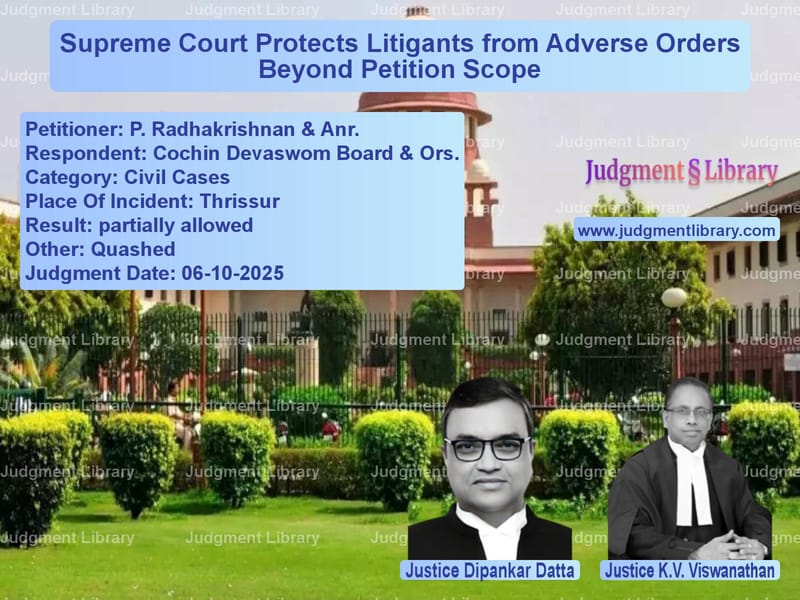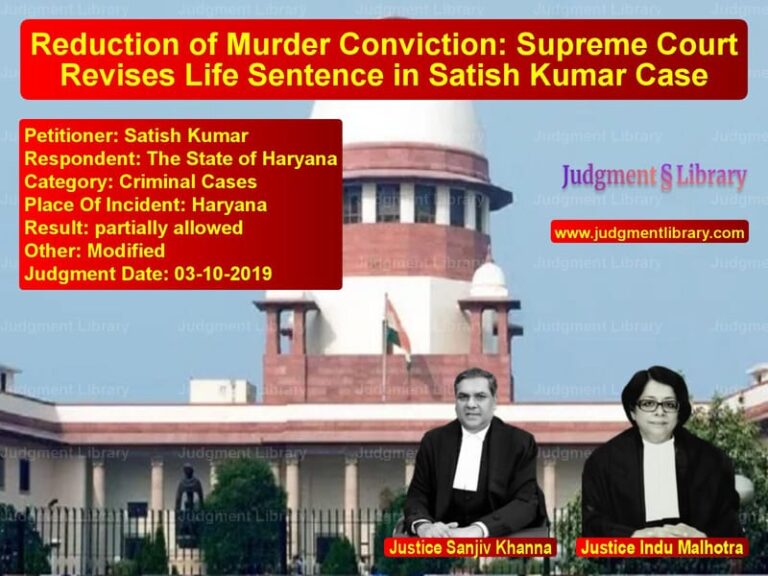Supreme Court Protects Litigants from Adverse Orders Beyond Petition Scope
In a landmark judgment delivered on October 6, 2025, the Supreme Court of India set aside certain directions issued by the Kerala High Court that went beyond the scope of the original writ petition. The case, which concerned a property dispute in Thrissur, Kerala, between P. Radhakrishnan and the Chinmaya Mission Educational and Cultural Trust against the Cochin Devaswom Board, highlights a fundamental principle of judicial propriety: courts should not pass orders that render litigants worse off than they were before approaching the court, especially without giving them an opportunity to be heard on such additional matters.
The Property Dispute and the Original Challenge
The legal battle began when the Cochin Devaswom Board, which manages Hindu temples and their properties in the region, significantly enhanced the annual license fee for land occupied by the Chinmaya Mission Trust. The trust had been using the land since 1974 to run a hall for marriages, religious, and cultural activities. Originally, the license fee was a nominal Rs. 227.25 per year. In 2014, the Board unilaterally increased this fee to Rs. 1,50,000 per annum, a massive hike that prompted the trust and its secretary, P. Radhakrishnan, to approach the High Court. They filed a writ petition seeking to quash the Board’s orders (Ext.P3, P7, and P9) that effected this enhancement and demanded arrears.
The petitioners argued that the hike was exorbitant, unilateral, and without prior notice. They emphasized that the hall was used for charitable and religious purposes, was often provided free for the Board’s activities as per the original agreement, and was not a significant profit-making venture. The High Court, after examining the case, upheld the Board’s decision to enhance the license fee to Rs. 1,50,000 per annum and dismissed the writ petition. The appellants, before the Supreme Court, fairly conceded to paying this enhanced fee along with the arrears. However, their grievance lay with two additional directions issued by the High Court in the same judgment, which they had never challenged or even anticipated.
The Controversial High Court Directions
After dismissing the writ petition, the High Court proceeded to issue two further directives. First, it ordered the Cochin Devaswom Board to take steps to fix the license fee for the land afresh, applying the principles laid down in a previous judgment, T. Krishnakumar v. Cochin Devaswom Board. This implied a potential for a further fee revision, possibly even higher. Second, and more severely, the High Court directed the Board to conduct an inquiry through its Chief Vigilance Officer (a Superintendent of Police) into the entire transaction of leasing the land to the Chinmaya Mission Trust. This directive for a vigilance inquiry into a decades-old transaction suggested possible wrongdoing and cast a shadow over the trust’s reputation.
The appellants were taken completely by surprise. They had gone to court challenging a specific fee enhancement, and the court had not only dismissed their challenge but had also added directions that opened the door for a higher fee and a potentially damaging criminal investigation. Mr. Gaurav Agrawal, learned Senior Counsel, submitted that the appellants in terms of the Ext.P3-Proceedings dated 16.09.2014 and Ext.P9-Notice dated 27.11.2020, shall pay the licence fee, at the rate of Rs.1,50,000/- per annum along with arrears to the first respondent-Cochin Devaswom Board. Their core argument was that a party cannot be put in a worse position for having approached the court seeking justice.
The Supreme Court’s Principled Stand
The Supreme Court, comprising Justices Dipankar Datta and K.V. Viswanathan, strongly agreed with the appellants. The Court found the High Court’s additional directions to be wholly unjustified and beyond the scope of the writ petition. The Court emphasized that the role of a court in a writ petition is to adjudicate on the specific grievances and reliefs raised by the petitioner. Venturing beyond this scope, especially without putting the affected parties on notice, violates fundamental principles of natural justice.
The Court quoted from its earlier judgment in V.K. Majota vs. Union of India and Others, stating, “The writ courts would be well advised to decide the petitions on the points raised in the petition and if in a rare case keeping in view the facts and circumstances of the case any additional points are to be raised then the concerned and affected parties should be put to notice on the additional points to satisfy the principles of natural justice. The parties cannot be taken by surprise.”
Furthermore, the Court relied on the precedent set in Ashok Kumar Nigam v. State of U.P., which established that a litigant cannot be rendered worse off by approaching the court. “The appellant could not, as observed earlier, be placed in a worse-off situation because of his having sought redress against the punishment awarded to him by the disciplinary authority which in the instant case is the High Court itself.” This principle, the Court clarified, applies broadly to all litigations, not just service matters.
The Court was particularly critical of the direction for a vigilance inquiry. It noted that such a direction for a “fishing and roving enquiry” could seriously impinge upon the reputation and character of the parties. The appellants had no opportunity to argue why such an inquiry was unwarranted or to defend the historical transaction. The Court underscored that even if such a direction was considered necessary in a rare case, the absolute minimum requirement would be to provide the parties a chance to present their case, which was not done here.
Broader Implications for Access to Justice
The Supreme Court’s judgment carries profound implications for the justice delivery system. It serves as a crucial reminder to courts at all levels to exercise restraint and circumspection. When courts pass orders that go beyond the pleaded case and adversely affect a litigant, it creates a “chilling effect.” Potential litigants may become hesitant to approach courts for fear that they might end up in a more precarious position than when they started. This fear can directly impact access to justice, a cornerstone of the rule of law.
The Court poignantly observed, “They will be left to wonder whether by going to court in matters where they perceive injustice has resulted, they will be rendered worse off than what they were, before initiating the proceedings. This could seriously impact access to justice and consequently the very rule of law.” This observation highlights the court’s role not just as an arbiter of disputes but as a guardian of the citizens’ faith in the legal system.
The Final Outcome
Consequently, the Supreme Court partly allowed the appeal. It expunged and set aside the two controversial paragraphs from the High Court’s order that directed a fresh fixation of license fee based on the T. Krishnakumar case and the vigilance inquiry. The Court clarified that this decision does not prevent the Cochin Devaswom Board from legitimately enhancing the license fee in the future, provided it is done independently and in accordance with the law. The Court also directed the appellants to pay the balance of the enhanced license fee (Rs. 1,50,000 per annum) and arrears, as they had voluntarily undertaken to do, within three months.
This judgment reinforces the bedrock principles of natural justice—audi alteram partem (hear the other side)—and judicial discipline. It ensures that the doors of the court remain a safe avenue for seeking redressal, not a potential gateway to unforeseen perils. For every citizen and entity that looks towards the judiciary for justice, this ruling reaffirms that their faith is well-placed, and the system is designed to protect their rights, not punish them for asserting them.
Petitioner Name: P. Radhakrishnan & Anr..Respondent Name: Cochin Devaswom Board & Ors..Judgment By: Justice Dipankar Datta, Justice K.V. Viswanathan.Place Of Incident: Thrissur.Judgment Date: 06-10-2025.Result: partially allowed.
Don’t miss out on the full details! Download the complete judgment in PDF format below and gain valuable insights instantly!
Download Judgment: p.-radhakrishnan-&-a-vs-cochin-devaswom-boar-supreme-court-of-india-judgment-dated-06-10-2025.pdf
Directly Download Judgment: Directly download this Judgment
See all petitions in Property Disputes
See all petitions in Landlord-Tenant Disputes
See all petitions in Contract Disputes
See all petitions in Legal Malpractice
See all petitions in Judgment by Dipankar Datta
See all petitions in Judgment by K.V. Viswanathan
See all petitions in partially allowed
See all petitions in Quashed
See all petitions in supreme court of India judgments October 2025
See all petitions in 2025 judgments
See all posts in Civil Cases Category
See all allowed petitions in Civil Cases Category
See all Dismissed petitions in Civil Cases Category
See all partially allowed petitions in Civil Cases Category







